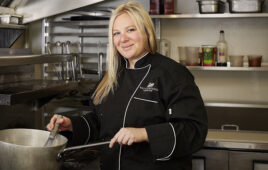According to Glemoor CC’s Executive Chef, if you want to be successful in this industry, you must have the right attitude—a productive one.
A colleague of mine and I were recently lamenting the fact that there are so few articles geared toward staff “these days.” You know, the ones that offer tips on how to get ahead and be successful in your career. The ones that explain how certain undesirable tasks are actually opportunities to learn something more about the bigger picture.
He told me a story about how on his first day as an apprentice he was tasked with polishing all the silver trays. But instead of complaining, he realized that polishing the trays would teach him how to keep silver clean and presentable. And that both lesson itself and its delivery is part of being a chef.
Brilliant topic, I thought. Where are those articles? I started looking. Then I started thinking.
We’ve all been focused on the attitude of the current labor force. It’s left many of us wondering how to manage the decline in the relentless work ethic that comes second nature to myself and most of my colleagues. Why aren’t there more anecdotes and articles to help guide today’s labor force into truly deserved and earned successes?
It would be a shame to see the attitudes, standards and work ethic we all uphold become obliterated or overshadowed by the labor force “these days.”
I’m not saying what I know and have endured as a chef is the right way or the be-all and end-all road to success. And perhaps the mentality of today’s labor force is going to revolutionize the industry as we know it. (Should I hold my breath?) What I am saying is if I hadn’t worked as hard as I have and still do—enduring long hours and jobs that no one else wants to do—I would not have earned the position I have now.
After that conversation, I was inspired to write a piece for many of the young up-and-coming culinarians making up our labor force “these days.” So here they are, some tips from an Executive Chef on how to push yourself to get ahead and be successful in this industry.
1. If You’re Passionate, Pay Attention to Detail
All too often during interviews with young culinarians new to the industry I hear them say, “This is my passion. Food is my passion.”
If you come in and interview with a Chef for a position in his or her kitchen and boast about the “passion” you have for food, then you better damn well prove that your passion is real. Very rarely have I come across an individual who maintains his or her “passion.” Once hired, you must endure all of the arduous or menial tasks expected of you including all of the ick factors of the job. Don’t get pissed because you’ve been asked to clean out the floor drain under your prep sink or line station. Don’t get pissed because you’ve been asked to scrape out all of the debris from the door gaskets on every single cooler on the line. Realize that these are all a part of the gig. It’s called attention to detail.
If you’re going to be successful as a chef, your attention to detail has to include all facets of the kitchen—not just cooking. Want to really wow ‘em? Take it a step further and show some initiative by cleaning the floor drains and the door gaskets as part of your daily or weekly tasks.
Trust me, your Chef will notice and will make note of this effort as a very big positive.
2. The Team is Most Important
Be a team player. Stop asking why you have to clean the floor drain while trying to validate how you think it’s a task for the dishwashers. We’re all on the same team. During any point in operations, whether it’s a slow day in the off-season or in the middle of getting our asses handed to us, I am never above hopping into the dish pit with my crew to bail them out if they start to fall behind. Why? Because it’s my job. I support my team.
If you’re going to be a part of the team, support the team.
3. Fall in Line.
Learn the phrase “Yes, Chef.” And understand what it means. Don’t argue.
I understand the need for inquiry—you want to know why you’re asked to perform any particular task. Learn the lesson and retain it.
Here’s an example from a few months ago: my sous had pointed out to my pizza guy that he was running low on cheese and that he should shred some. The pizza guy asked, “Am I the only one who uses this cheese? If I’m not the only one who uses it, then I’m not going to shred it until tomorrow since I’ve already got two sixth pans on the line and that’ll get me through tonight.”
Really?!
He had to be reminded that our weekly happy hour was the next evening. And during that event, we go through a lot of pies. He conceded to doing what was a simple task asked of him and is a regular part of his responsibilities, but not without a fight.
This actually points out two lessons. Understand that there is a reason you’re being asked to perform any task and understand the big picture. Realizing that operations involves more than simply what’s going on now will get you far. Being a Chef involves knowing what’s going on in every outlet of the operation not only today, but tomorrow and into next week.
4. Show Some Stamina
Plain and simple, this job is physically demanding and requires endurance.
With all the new fitness trackers available on the market, anyone can track the number of steps they take with an average daily goal of around 10,000. The other day, our catering assistant interrupted her explanation on a BEO issue with a gasp, “Oh my God,” she said. “I just hit 10,000 steps. No wonder I’m so tired.” This was at 7:30 in the evening. My sous laughed out loud and said, “I hit that at 9:47 this morning. My daily average is 32,000.”
Here’s another example: I had a former employee who on a nightly basis took his break at night when everyone else was breaking down and cleaning up to go home. When I told him that breakdown and clean up are to be a team effort, he replied, “But I’m tired. I’ve been on my feet for the last 4½ hours. I need to rest and if I don’t get rest I get really grumpy.” The fact that he had the nerve to say this to both his Chef and Sous Chef, who were both going on their 14th hour on their feet, is beyond comprehension.
One more example: The same colleague who inspired this post shared a story with me of one of his cooks who called in sick for nine days in a row. He had an ear infection. By the time he was feeling better, he needed a day to rest because he didn’t sleep well the night before. Chef’s retort: “So you’re calling in now because you’re tired?”
I don’t believe he lasted too much longer on that team.
5. Learn What Needs to Be Learned
As a Chef, I understand the importance of leading, guiding and teaching your team. But is it too much to ask that those who are here to learn are actually interested in learning what needs to be learned?
I don’t know it all. But I know that what works for me continues to prove efficient and successful and has worked for me during my arduous climb up the ladder.
Here’s what I know: attention to detail, teamwork, compliance and endurance are just a few of the prerequisites of this job. These are the things that worked for me when I was trying to make it in this industry. And these same things will help you “these days.”



